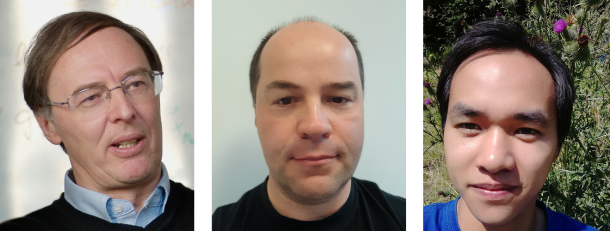- Strona główna
- Aktualności
- Wydarzenia
- Cykl zaawansowanych wykładów c.d. "High Pressure Chemical Crystallography"
Cykl zaawansowanych wykładów c.d. "High Pressure Chemical Crystallography"
W dniach 15 - 17 Kwietnia 2024 Instytut będzie gościł cykl wykładów prowadzonych przez Prof. Leonida Dubrovinskyego, światowego eksperta w fizyce ultra-wysokich ciśnień z University of Bayreuth, wraz z krótkimi wystąpieniami towarzyszącymi.
Advanced lecture series "Oxide materials for optoelectronics" in the framework of the STER programme
"High Pressure Chemical Crystallography: Methodology and Applications
for Oxides, Nitrides, Halides, Hydrides, and Carbidesby"
University of Bayreuth, Bayreuth, Germany
Three lectures on April 15th, 16th and 17th 2024, at the IP PAS Leonard Sosnovski Auditorium, each preceded by short introductory talks.
Duration of each lecture: 45 min
The event will be available on ZOOM also, at this link
All Warsaw-4-Phd students (and others) very welcome!
LECTURE SCHEDULE
High-pressure studies have had an enormous impact on fundamental physics, chemistry, and especially Earth and planetary sciences. Modern science and technology rely on the fundamental knowledge of matter provided by crystallographic studies. Chemical crystallography, a well-established discipline, is based on single-crystal X-ray diffraction (SCXRD) analysis, which enables structure determination and chemical characterization. Until recently, determining structures using SCXRD in a diamond anvil cell (DAC) at high pressures beyond 15 GPa was challenging. SCXRD analysis was considered inapplicable to materials synthesized at high pressures in a laser-heated (LH) DAC, as the products of chemical reactions are typically multiphase mixtures of microcrystalline solids. About a decade ago, our group pioneered an approach to SCXRD data collection and analysis for the products of chemical reactions in LHDACs that led to the discovery of new materialswith unique properties. However, it required certain training, crystal-chemical intuition, and experience. Since then, we have designed and built new instrumentation to enable sophisticated in situ experiments in-house and at synchrotron radiation facilities, and created powerful software (the Domain Auto Finder (DAFi) program) for studies of multiphase polycrystalline and microcrystalline (powder) materials. Our efforts have pushed the range of static pressures achievable in DACs up to 1 TPa and enabled single-crystal X-ray diffraction experiments under such extreme conditions. Structural studies at simultaneous high pressures of over ~200 GPa and temperatures of several thousand degrees have also become possible. This has led to remarkable findings in solid-state physics, mineral physics, and chemistry under extreme conditions, including the discovery of numerous, often unpredictable materials and insight into possible physical phenomena underlying their formation, chemical bonding, and properties.
The series of three lectures will cover (1) methodological aspects of the diamond anvil cell technique (diamond anvils; DACs preparation; pressure measurements; laser heating in DACs; SCXRD in DACs; analysis of diffraction data collected in DACs), (2) high-pressure oxides chemistry (effects of pressure on chemical composition and crystal chemistry of oxides; changes in structural types with compression on the example of dioxides; access to metastable states of oxides under pressure on the example of silica; novel high-pressure chemistry of iron oxides; effects of spin state on crystal chemistry of transition metal oxides; structure-properties relations in high-pressure oxide phases; variation of oxygen oxidation state and its significance for past and present of Earth), and (3) synthesis and properties of novel nitrides, halides, and carbides (why and how nitrides, halides, hydrides, and carbides should be synthesized under pressure; enhanced stability of polyanions under high pressures; how accurately theory predicts chemical composition and structures of high-pressure phases; fantastic crystal chemistry as a reason for fantastic properties; extremely incompressible and hard nitrides; unexpected possible origin of organic matter in the Universe; hopes and disappointments in the search for high-temperature superconductivity).
This event is supported by the Polish National Agency for Academic Exchange, grant no. BPI/STE/2021/1/00034/U/00001
Cykl wykładów jest finansowany przez program STER NAWA




